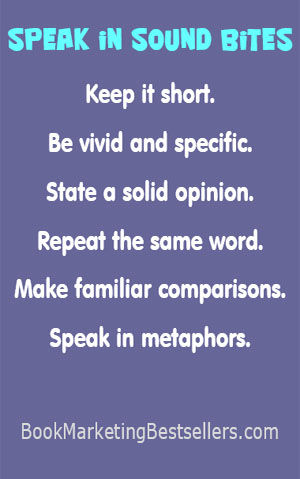The following article is adapted from an email I received today from Steve Harrison.
How do editors, writers, and producers decide who they will interview? Obviously they want someone who knows what he or she is talking about, but they also want people who know how to provide succinct answers, people who know how to speak in effective sound bites.
Too many book authors take ten minutes to say what can often be said in 30 seconds or less. If you want to get the attention of newspaper editors, magazine writers, or radio and TV producers, you need to learn how to speak in sound bites.

Here are Steve’s six commandments on speaking in sound bites:
1. Keep it short. In answering questions or making a point, keep it short, no more than a sentence or two.
2. Be vivid and specific. In Steve’s example below, note how Broughton made something boring truly memorable for the journalist.
In an interview with Business Week, Donald Broughton, an analyst for Avondale Partners, was talking about the stocks of two railroad companies: Union Pacific and Burlington Northern: “It’s one thing if you steal dirt from my front yard, and it’s another if you break into my house and take my sterling silver. For six quarters, Union Pacific’s been walking around Burlington Northern’s house and taking as much silver, jewels, and flat-screen TVs they can get their hands on.”
3. State a solid opinion. Don’t be afraid to state your opinion and do it boldly. Yes, some people will disagree with you, but so what? Indeed, you should be worried if everyone agrees with you. If people don’t disagree with you, you’re probably not really saying much.
Here’s another example from Steve to make this point:
When Warren Buffett was interviewed about a tax on financial companies, he said, “Look at the damage Fannie and Freddie caused, and they were run by Congress. Should we have a special tax on Congressmen because they let this thing happen to Freddie and Fannie? I don’t think so.”
4. Repeat the same word. Repeating the same words makes a statement more memorable. Here are two examples provided by Steve (note how short the sentences are):
Author Robert Thompson on Paris Hilton: She’s the non-story that keeps on being a non-story.
Warren Buffett on investing: Be fearful when others are greedy and greedy when others are fearful.
5. Make familiar comparisons. Compare a thing to something that everyone already knows about.
In describing Katie Couric’s debut on CBS Evening News, Robert Thompson said that her first broadcast would be “some of the most scrutinized frame-by-frame video images since the Zapruder film” (of John F. Kennedy’s assassination).
6. Speak in metaphors. A metaphor is a figure of speech where one thing is identified similar to something very unlike it. Here’s an example from Steve:
When talking about Fox News, Robert Thompson says, “They want to be the David of David and Goliath, but they are the Goliath.”
Sound bites are always golden. Use them in interviews. Use them in media pitches. Use them in news releases. Use them in catalog copy. Use them in blog posts. Use them in social media.
A good sound bite is the best way to make a point. The sharper the sound bite, the sharper the point. Make your points sharp!
About John Kremer
John Kremer is author of 1001 Ways to Market Your Books, the Relationships Matter Marketing program, and many other books and reports on book marketing, Internet marketing, social media, and book publicity. -- John Kremer on Book Marketing.

